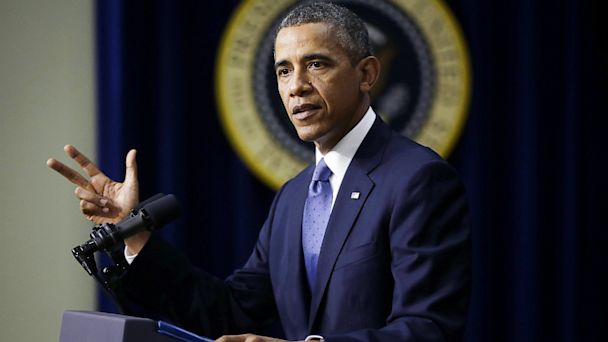Obamacare Arrives 3 Years Later, Little Understood and Not Well-Liked

Pablo Martinez Monsivais/AP Photo
More than three years after Obamacare was signed into law and fewer than two weeks before its health insurance exchanges are to launch, many Americans don't know a lot about the pending changes except this: They don't much like them.
Sixty-two percent in a new ABC News-Washington Post poll say they lack the information needed to understand the changes that will take effect as the Affordable Care Act is implemented. Barely one in 10, moreover, thinks the federal government, their state government or the health insurance industry is fully prepared to implement the law.
See PDF with full results and charts here.
On the law itself, moreover, 52 percent are opposed, vs. 42 percent in support; in 16 ABC-Post polls since August 2009, it has never received majority support.
Fifty-five percent, further, disapprove of the way Barack Obama is handling implementation of the law, with "strong" disapprovers outnumbering strong approvers by a 23-point margin. And Obama and the Republicans in Congress essentially are tied in trust to handle its implementation, 41-38 percent, respectively, with most of the rest saying they trust neither.
Trust in "neither" is its highest in 10 ABC-Post polls since June 2009 asking about health care overhaul or its implementation. Trust in Obama is at a new low, while trust in the Republicans matches its lowest in more than three years.
Strong opposition to the law outstrips strong support by 13 percentage points, 39 vs. 26 percent, in this poll, produced for ABC News by Langer Research Associates. Critics are so fired up that among those who oppose the law, 52 percent say they'd support Congress' shutting down the federal government's major activities in order to block it, as some House Republicans have suggested. (The net support for this idea, among all Americans, is 27 percent.) The House votes today on another proposal, to strip funding for the law's implementation.
For all that, there is one potentially positive result for proponents of the law: People who are informed about it are 18 points more likely than others to support it. That could mean that learning about the law encourages support; on the other hand, it also could mean that its supporters are more motivated than its critics to learn about it.
EFFECTS - More people say the law has had negative rather than positive effects so far, although many as yet see no impact. Thirty-six percent, for example, say it's worsened the health care system overall, vs. 19 percent who see improvement. The rest, 39 percent, see no effect.
Many more, about six in 10 Americans (55 to 63 percent), say the law so far has had no effect on them personally, their health care costs, insurance coverage or care experiences. But among those who do report an impact, it's more apt to be negative. Thirty-three percent report negative effects on their costs, 25 percent on their coverage and 22 percent on the quality of their care. Positive effects, by contrast, are reported by only about one in 10 in each case.
READY? - In terms of readiness, majorities think the federal government and their state governments are unprepared for the law, with those who say they are entirely unprepared outnumbering those saying they're fully prepared by more than 2-1. Americans split on the overall readiness of the insurance industry but, again more say it's entirely unprepared (20 percent) than see it as fully prepared (10 percent).
Information interacts with this view, as well: Among those think they are informed about the law, perceptions of readiness of these groups rise by 13- to 23-point margins.
PARTISANSHIP - As usual, partisanship and ideology factor strongly in these views. Six in 10 Democrats and liberals support the law, but more Republicans and "very" conservatives oppose it, nearly eight in 10 in each group. Half of Republicans overall, and 54 percent of strong conservatives, say they'd support shutting down the government in order to block its implementation. Given their predispositions on the law, Republicans and conservatives also are more likely than others to say it has worsened the health care system overall, as well, as their own costs, coverage and quality of care.
More independents oppose the law than support it (54-42 percent), and they're closely divided on the idea of trying to block it via a government shutdown.
OTHER GROUPS - Support for the law is greater among men than women; while 46 percent of men support, it drops to 38 percent of women. That's somewhat surprising, in that women are more likely to be Democrats; on the other hand, women also are more frequent users of the health care system, so may believe they're more at risk.
There's also a gap by education, with support for the law 12 points higher among college graduates than among nongraduates. And, by income, support bottoms out at 36 percent among those in the $50,000-$100,000 bracket, vs. 54 percent among those with incomes more than $100,000.
And, notably, the law's support is weak even among African-Americans, probably Obama's single-most loyal support group. Eighty-seven percent of blacks approve of Obama's job performance overall. But just 48 percent support his signature health care law.
METHODOLOGY - This ABC News-Washington Post poll was conducted by telephone Sept. 12-15, 2013, in English and Spanish, among a random national sample of 1,004 adults, including landline and cellphone-only respondents. Results have a margin of sampling error of 4 points, including design effect. Partisan divisions are 34-23-34 percent, Democrats-Republicans-independents.
The survey was produced for ABC News by Langer Research Associates of New York, N.Y., with sampling, data collection and tabulation by Abt-SRBI of New York, N.Y.